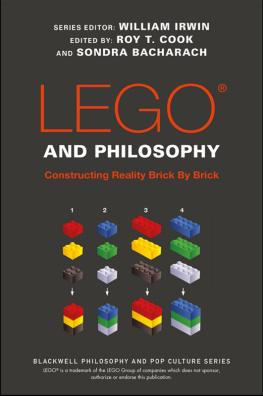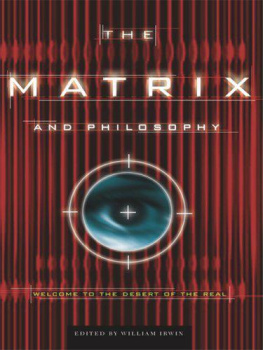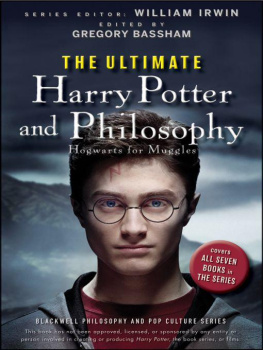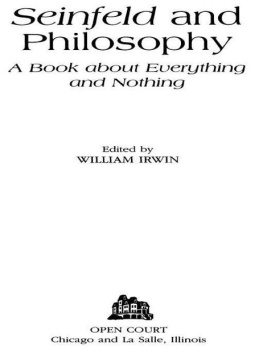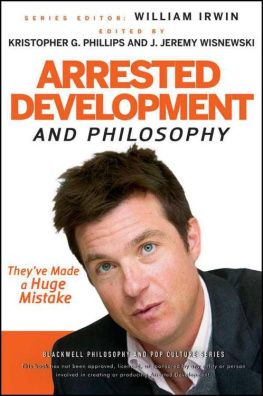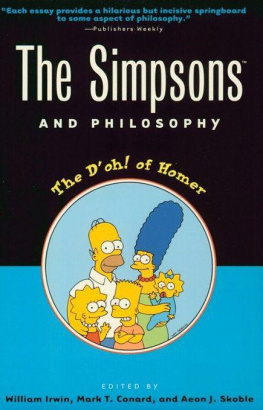William Irwin - Superheroes: The Best of Philosophy and Pop Culture
Here you can read online William Irwin - Superheroes: The Best of Philosophy and Pop Culture full text of the book (entire story) in english for free. Download pdf and epub, get meaning, cover and reviews about this ebook. year: 2011, publisher: Wiley, genre: Politics. Description of the work, (preface) as well as reviews are available. Best literature library LitArk.com created for fans of good reading and offers a wide selection of genres:
Romance novel
Science fiction
Adventure
Detective
Science
History
Home and family
Prose
Art
Politics
Computer
Non-fiction
Religion
Business
Children
Humor
Choose a favorite category and find really read worthwhile books. Enjoy immersion in the world of imagination, feel the emotions of the characters or learn something new for yourself, make an fascinating discovery.

- Book:Superheroes: The Best of Philosophy and Pop Culture
- Author:
- Publisher:Wiley
- Genre:
- Year:2011
- Rating:5 / 5
- Favourites:Add to favourites
- Your mark:
- 100
- 1
- 2
- 3
- 4
- 5
Superheroes: The Best of Philosophy and Pop Culture: summary, description and annotation
We offer to read an annotation, description, summary or preface (depends on what the author of the book "Superheroes: The Best of Philosophy and Pop Culture" wrote himself). If you haven't found the necessary information about the book — write in the comments, we will try to find it.
Superheroes: The Best of Philosophy and Pop Culture — read online for free the complete book (whole text) full work
Below is the text of the book, divided by pages. System saving the place of the last page read, allows you to conveniently read the book "Superheroes: The Best of Philosophy and Pop Culture" online for free, without having to search again every time where you left off. Put a bookmark, and you can go to the page where you finished reading at any time.
Font size:
Interval:
Bookmark:
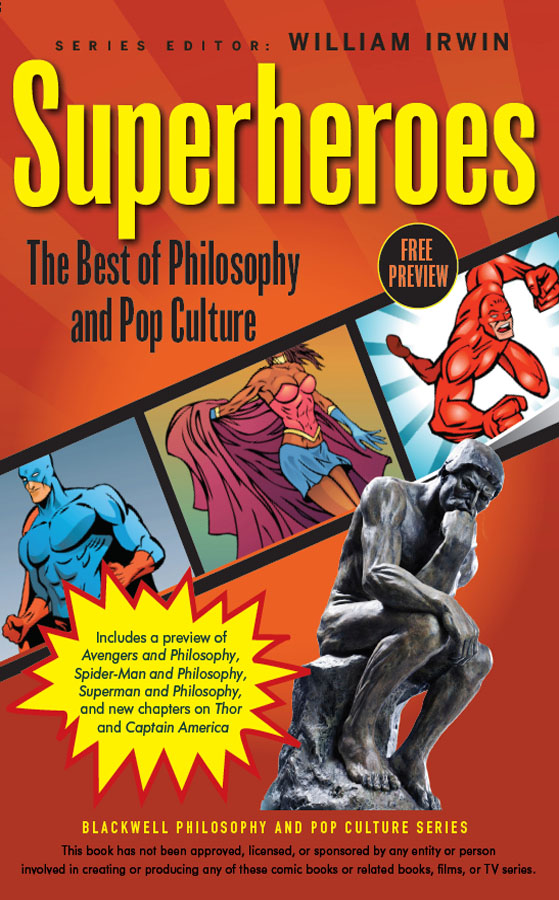
Contents
The Blackwell Philosophy and Pop Culture Series
Series Editor: William Irwin
South Park and Philosophy
Edited by Robert Arp
Metallica and Philosophy
Edited by William Irwin
Family Guy and Philosophy
Edited by J. Jeremy Wisnewski
The Daily Show and Philosophy
Edited by Jason Holt
Lost and Philosophy
Edited by Sharon Kaye
24 and Philosophy
Edited by Jennifer Hart Weed, Richard Davis, and Ronald Weed
Battlestar Galactica and Philosophy
Edited by Jason T. Eberl
The Office and Philosophy
Edited by J. Jeremy Wisnewski
Batman and Philosophy
Edited by Mark D. White and Robert Arp
House and Philosophy
Edited by Henry Jacoby
Watchmen and Philosophy
Edited by Mark D. White
X-Men and Philosophy
Edited by Rebecca Housel and J. Jeremy Wisnewski
Terminator and Philosophy
Edited by Richard Brown and Kevin Decker
Heroes and Philosophy
Edited by David Kyle Johnson
Twilight and Philosophy
Edited by Rebecca Housel and J. Jeremy Wisnewski
Final Fantasy and Philosophy
Edited by Jason P. Blahuta and Michel S. Beaulieu
Alice in Wonderland and Philosophy
Edited by Richard Brian Davis
Iron Man and Philosophy
Edited by Mark D. White
True Blood and Philosophy
Edited by George Dunn and Rebecca Housel
Mad Men and Philosophy
Edited by James South and Rod Carveth
30 Rock and Philosophy
Edited by J. Jeremy Wisnewski
The Ultimate Harry Potter and Philosophy
Edited by Gregory Bassham
The Ultimate Lost and Philosophy
Edited by Sharon Kaye
Green Lantern and Philosophy
Edited by Jane Dryden and Mark D. White
The Girl with the Dragon Tattoo and Philosophy
Edited by Eric Bronson
Arrested Development and Philosophy
Edited by Kristopher Phillips and J. Jeremy Wisnewski

Copyright 2011 by John Wiley and Sons. All rights reserved
Published by John Wiley & Sons, Inc., Hoboken, New Jersey
Published simultaneously in Canada
No part of this publication may be reproduced, stored in a retrieval system, or transmitted in any form or by any means, electronic, mechanical, photocopying, recording, scanning, or otherwise, except as permitted under Section 107 or 108 of the 1976 United States Copyright Act, without either the prior written permission of the Publisher, or authorization through payment of the appropriate per-copy fee to the Copyright Clearance Center, 222 Rosewood Drive, Danvers, MA 01923, (978) 750-8400, fax (978) 646-8600, or on the web at www.copyright.com . Requests to the Publisher for permission should be addressed to the Permissions Department, John Wiley & Sons, Inc., 111 River Street, Hoboken, NJ 07030, (201) 748-6011, fax (201) 748-6008, or online at http://www.wiley.com/go/permissions .
Limit of Liability/Disclaimer of Warranty: While the publisher and the author have used their best efforts in preparing this book, they make no representations or warranties with respect to the accuracy or completeness of the contents of this book and specifically disclaim any implied warranties of merchantability or fitness for a particular purpose. No warranty may be created or extended by sales representatives or written sales materials. The advice and strategies contained herein may not be suitable for your situation. You should consult with a professional where appropriate. Neither the publisher nor the author shall be liable for any loss of profit or any other commercial damages, including but not limited to special, incidental, consequential, or other damages.
For general information about our other products and services, please contact our Customer Care Department within the United States at (800) 762-2974, outside the United States at (317) 572-3993 or fax (317) 572-4002.
Wiley also publishes its books in a variety of electronic formats and by print-on-demand. Some content that appears in standard print versions of this book may not be available in other formats. For more information about Wiley products, visit us at www.wiley.com .
ISBN 978-1-118-15347-5 (ebk); ISBN 978-1-118-15348-2 (ebk)
About the Book
This is a compilation of some of our best superhero essays in the Blackwell Philosophy and Pop Culture series with a preview of some of our forthcoming books and two essays that are exclusive to this sampler.
Part One: Superheroes Exclusives
1. Lord Odin Have Mercy: Justice and Punishment in Asgard
Mark D. White
2. Captain America and the Virtue of Modesty
Mark D. White
Part Two: DC Superheroes
3. Is Superman an American Icon?
Andrew Terjesen
From Superman and Philosophy , edited by Mark D. White
4. The Blackest Night for Aristotles Account of Emotions
Jason Southworth
From Green Lantern and Philosophy , edited by Jane Dryden and Mark D. White
5. Why Doesnt Batman Kill the Joker?
Mark D. White
From Batman and Philosophy , edited by Mark D. White and Robert Arp
6. Can We Steer This Rudderless World?: Kant, Rorschach, Retributivism, and Honor
Jacob M. Held
From Watchmen and Philosophy , edited by Mark D. White
Part Three: Marvel Superheroes
7. Forgivers Assemble!
Daniel P. Malloy
From Avengers and Philosophy , edited by Mark D. White
8. Does Peter Parker Have a Good Life?
Neil Mussett
From Spider-Man and Philosophy , edited by Jonathan J. Sanford
9. The Stark Madness of Technology
George A. Dunn
From Iron Man and Philosophy , edited by Mark D. White
10. Amnesia, Personal Identity, and the Many Lives of Wolverine
Jason Southworth
From X-Men and Philosophy , edited by Rebecca Housel and J. Jeremy Wisnewski
Introduction
Taking Superheroes Seriously
William Irwin
Philosophy can change your life, but it may take a superhero for you to realize it. Superman, Batman, Spider-Man, and company dont just entertain us; they prompt us to think. I mean, why doesnt Batman just kill the Joker and be done with it? Sure, that would be bad for future comic book sales, but, as well see in this book, the Dark Knight has his philosophical reasons, too.
Philosophers specialize in theory, but people tend to learn better when something unfamiliar, such as philosophy, is explained in terms of something familiar, such as television, movies, comic books, music, or videogames. The philosophers of old understood this and came up with their own memorable examples to illustrate their theories, from Platos (428348 BCE) allegory of the cave to Descartes (15961650) evil deceiver and beyond. In this book, we continue that long tradition by using examples from the realm of superheroes.
Why? Because superheroes are complex characters and have become the mythology of our time (literally, in the case of Thor!). Like the gods, superheroes tend to have basic origin stories and character traits, which set the stage for a limitless number and variety of tales. And like the gods of mythology, superheroes are not perfect; they are not like the all-loving, all-good, all-powerful God of Western religion. Still, our flawed heroes can act as moral exemplars. For those not inclined to ask W.W.J.D.?, it can make sense to ask W.W.C.A.D.? What would Captain America do?
Some people might worry that we cant learn anything from superheroes since theyre just make-believe, but, like the ancient myths, tales of superheroes dont need to be true or realistic to be inspiring. You dont need to have been bitten by a radioactive spider to realize that with great power comes great responsibility. Heck, you dont even need to have great power to learn and appreciate that lessonkids and grown-ups alike have gotten that lesson from Spidey for decades.
Font size:
Interval:
Bookmark:
Similar books «Superheroes: The Best of Philosophy and Pop Culture»
Look at similar books to Superheroes: The Best of Philosophy and Pop Culture. We have selected literature similar in name and meaning in the hope of providing readers with more options to find new, interesting, not yet read works.
Discussion, reviews of the book Superheroes: The Best of Philosophy and Pop Culture and just readers' own opinions. Leave your comments, write what you think about the work, its meaning or the main characters. Specify what exactly you liked and what you didn't like, and why you think so.

